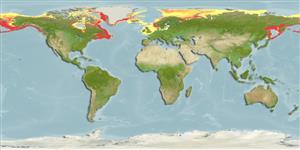Preferred temperature (Ref.
115969): 0.2 - 7, mean 2.3 (based on 1058 cells).
Phylogenetic diversity index (Ref.
82804): PD
50 = 1.0000 [Uniqueness, from 0.5 = low to 2.0 = high].
Bayesian length-weight: a=0.00355 (0.00148 - 0.00852), b=2.95 (2.74 - 3.16), in cm Total Length, based on LWR estimates for this (Sub)family-body shape (Ref.
93245).
栄養段階 (Ref.
69278): 3.3 ±0.39 se; based on food items.
回復力 (Ref.
120179): 低い, 4.5年~14年の倍増期間の最小個体群 (tm=7; tmax=12; K=0.099; Fec=931).
Fishing Vulnerability (Ref.
59153): High vulnerability (59 of 100).
